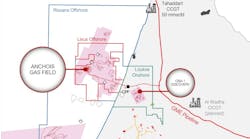Increasingly, offshore O&G companies rely on complex global supply chains to move people and equipment around the world to capitalize on new opportunities and to address critical situations. Often, multiple entities within the same enterprise – from employment companies to regional headquarters to equipment leasing organizations – must come together to successfully deliver a project. While the customer may recognize these various parties as one enterprise, local tax authorities see each company as a distinct organization. Efficiently structuring and pricing transactions between related parties, or transfer pricing, is a critical success factor in managing enterprise risk and enhancing the bottom line.
Governments are under duress to increase revenue in light of the global economic downturn. Tax authorities around the world see that transfer pricing directly impacts how much income will be subject to tax in their respective jurisdictions and, as a result, understandably scrutinize intercompany charges. Almost 100 countries worldwide have established rules related to transfer pricing with most requiring some form of documentation for intercompany charges. As offshore O&G companies tend to have a significant number of related party transactions, industry participants are on the radar in many countries.
Another factor making the offshore O&G industry particularly susceptible to transfer pricing issues is the mobility of the assets and people. Platforms, rigs, and other vessels may transfer between jurisdictions quickly – necessitating corresponding movements of personnel and equipment – due to environmental conditions, political instability, or customer demands.
While the majority of jurisdictions have adopted the arm's-length standard – the principle that members of the same commonly controlled enterprise should deal with each other as if they are unrelated – other countries, such as Brazil, impose their own unique policies. Local content rules – such as those in Nigeria – may add further complexity when companies establish local subsidiaries to satisfy the requirements.
Transfer pricing is most often associated with the sale or lease of tangible goods among members of the same controlled group; however, intercompany transactions also include loans and financing, the licensing and sale of intangible property, and the provision of services between related parties. Parent company guarantees are an example of a standard practice throughout the industry that may create a transfer pricing issue if not properly addressed.
Customers may demand a performance guarantee from the parent company if a subsidiary is signing a contract in the local country. The parent company's tax authority may expect the subsidiary to compensate the parent for providing the guarantee; at the same time, the tax authority in the subsidiary's jurisdiction may disallow a deduction of the guarantee fee from the subsidiary's income tax return deeming the charge as an attempt to shift income erroneously. In these instances, the enterprise may be in the position of having to pay additional tax in the parent company's jurisdiction with no corresponding offset in the subsidiary's country.
Similar issues arise with respect to the provision of services between related parties. In many instances, charges for management fees may be deemed as not deductible for income tax purposes in certain jurisdictions if transfer pricing rules are not satisfied. In the event these charges are disallowed following an audit or examination by the local tax authority, the enterprise may not only face additional tax but also fines, penalties, and interest. In certain jurisdictions, unresolved or negatively concluded tax matters may result in jail time for company officials.
While specific rules vary between jurisdictions, there are common leading practices which apply. Communication between operations and the corporate tax department is vital. By keeping the tax group apprised of operational plans, offshore O&G companies can better plan and document their transfer pricing in the jurisdictions in which they conduct business concurrently with their activities. Addressing transfer pricing matters in real time is important because after-the-fact analyses may result in gaps between how transactions actually take place and how they are reported. Cooperation between the departments is also important for managing other tax exposures, particularly those related to customs and indirect tax as well as income tax.
A practical approach to planning and documenting transfer pricing is also key. Offshore O&G enterprises must educate themselves on the specific rules and regulations of the various jurisdictions in which they operate ahead of commencing activities in those countries. Further, leading practices direct that multinational enterprises create a unified framework which includes an analysis of the functions performed, assets and resources employed, and risks borne by each affiliate entering into transactions with related parties. This core functional analysis may then be supplemented with jurisdiction-specific documentation to address the local requirements of each country in which the company operates.
Ultimately, the result of not addressing transfer pricing proactively for offshore O&G companies is a direct hit to the bottom line and increased enterprise risk.
Dale W. Bond, Partner
Nicolas L. Raby, Principal
Elizabeth A. Sweigart, Director
PricewaterhouseCoopers LLP
Houston, Texas
This page reflects viewpoints on the political, economic, cultural, technological, and environmental issues that shape the future of the petroleum industry. Offshore Magazine invites you to share your thoughts. Email your Beyond the Horizon manuscript to David Paganie at[email protected].


